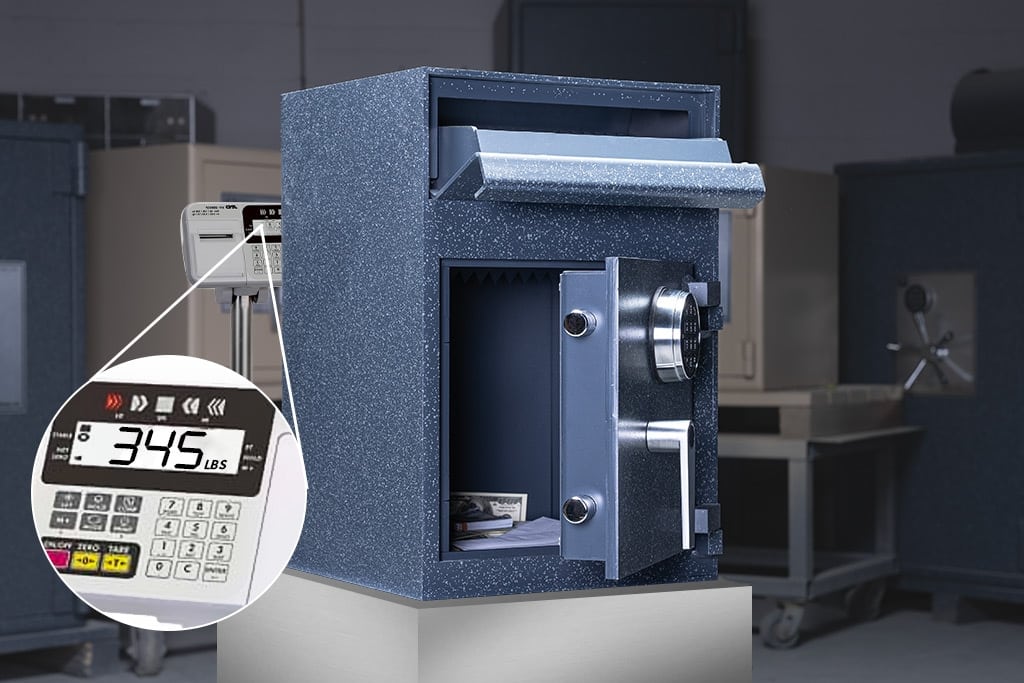
In recent years, people have been becoming increasingly concerned about their homes being broken into and their valuables being stolen, to the extent that the global safes and vaults market was valued at $5.82 billion in 2019, and is projected to reach $9.14 billion by 2027 – growing at a rate of 8.1% per year [source].
However, with so many different types of safes available on the market, it can be easy to get overwhelmed by all the different options. So, in this article we’ll help you better understand the role that the weight of a safe has in determining how secure it actually is when it comes to protecting your irreplaceable possessions, valuables, and documents.
Why Are Some Safes So Heavy?
First, let’s look at factors that play a part in how heavy a safe is, such as the composition, the steel wall thickness, the safe’s size, and its design.
Composition
The combination of the layers of metal and concrete that a safe is made of, plays one of the biggest roles in how heavy a safe is. For example, high-security safes use various different layers, which can include fire proof materials that help shield your valuables from heat and flames, and ballistic steel layers to protect against heavy-duty power tools, sophisticated explosives, and more. The use of multiple layers also requires burglars to have a variety of tools with them in order to break each of the different layers, making it more inconvenient and requiring a longer amount of time to open the safe. The specific layers and materials used vary from company to company, but will ultimately determine the weight of your safe. However, the heavier the safe is, the greater the protection it provides for your most valuable items.
Steel Wall Thickness
The factor that indicates how thick the steel walls are, is called its gauge. The lower the gauge number, the thicker the steel, and the higher the gauge number, the thinner the steel. While this may sound counterintuitive, simply remember that a safe with a lower gauge number means more security for you, because it’s going to be thicker and less prone to damage. For the highest security, you should generally choose a safe with thick steel walls between 12- and 6-gauges. This translates to a thickness of 2.057 mm (0.081″) for a 12-gauge wall, and 4.166 mm (0.164″) for a 6-gauge wall.
Size Of Safe
Typically speaking, if you buy a large safe, it is going to be heavy. And the bigger the safe is, the heavier it is going to be. A good general rule of thumb when deciding what size of safe you should buy, is to buy a safe that has more space than what you need at the moment. This is because chances are, during your lifetime you’ll have more things that you want to store in it – whether it’s valuables, priceless possessions, or important documents.
Design Features
Depending on the manufacturer, safes have various different built-in security features, which not only add to the safe’s weight but also make it more secure. This is typically a bonus, because added security features not only create better protection, but they also add more weight onto the safe to safeguard your items from theft. In high-security safes, these design features can include heavy materials such as cement, reinforced steel, heavy-duty locking mechanisms, and more – all of which add to the weight and security level.
The Benefits Of Heavy Weight Safes
The first and most obvious argument in favor of heavy safes is that, even if a burglar breaks into your house, they’re not capable of simply picking up the safe and leaving with it – which makes your valuables, important documents, or firearms far less prone to theft.
A high-security safe’s weight comes primarily from its thick steel walls and composite structure – which not only add significant weight, but the multi-layered walls provide significant protection. So, if someone ever breaks into your house or office and tries to cut through the safe, they’ll have a very hard time doing that without power tools and equipment – which make a lot of noise and are bound to alarm someone. Additionally, heavier safes generally offer a higher level of protection against heat and fire damage than lighter ones, as well.
While heavy safes are more secure since they are less likely to be stolen, cut through, or be destroyed by fire, there are, however, many other factors that can affect how secure a safe is. These include the security features, type of the lock, certification level, as well as the quality of the manufacturer’s workmanship. Doing your research and making a purchase from a reputable seller is always advised when buying safes. Nobody wants to find themselves with a safe that isn’t working properly when it matters most.
How Much Does A “Good” Heavy Safe Weigh
Firstly, a “good” safe is defined as a safe that will withstand its indicated level of security and protection, when it matters most. These types of safes typically range from 100 lbs (45 kg) to 240 lbs (110 kg), with the average being around 185 lbs (85 kg). Any safe that weighs less than that is considered a “safe box”, rather than a proper safe intended to protect valuables. These are the ones that you’ll normally find in a big box store, intended for low security needs in homes and offices, and typically only weigh between 15 lbs (7 kg) and 45 lbs (20 kg). These safes don’t offer much protection at all, and can easily be picked up and carried away. You can use them if you’re not really putting anything valuable in them, or if you’re just hiding stuff in a secure place.
Good safes that are designed to be placed in a home or office to offer high security, can weigh up to 600 lbs (280kgs). So, if you need to store valuable assets such as irreplaceable jewelry, important documents, or luxury goods, then it is highly recommended that you consider a safe in this weight range to properly secure your assets. These heavy weight safes offer the highest level of protection against burglary, and are typically strong enough to survive walls collapsing on them in the event of a fire.
Commercial safes are a whole different thing. Their weight can range from 770 lbs (350 kgs), to whatever the buyer needs for maximum protection. While these safes offer a far higher security level than the typical homeowner or business needs, there are businesses such as diamond stores, financial institutions, and other high-value industries and collectors that require this extreme level of protection.
As a general rule, you should keep in mind that a good home or office safe, should be too heavy for one person to carry it alone. A good minimum weight for a secure safe should be no less than 150 lbs (70 kg). Regardless of the weight of safe you choose, it is always recommended to bolt it down, as we’ll discuss below.
Why Should You Bolt Down Your Safe – If It’s Heavy?
Many people think that it’s unnecessary to bolt down a heavy safe, but that’s not the case. Bolting down your safe provides you with even more security, since it’s impossible for someone to move it without the use of specialized equipment. And because of this, you are more likely to qualify for lower insurance premiums and higher coverage of the valuables locked away in a fully secured, certified safe.
If you’re not sure where the best location is to place your safe, how to properly bolt down a safe, or you’re concerned about damaging your property, a high-security safe manufacturer such as INKAS® Safes can refer you to reputable local contractors all across North America that will be happy to help you with that.
Choosing A Heavy Safe That’s Right For You
There are many factors that make heavy weight safes far more secure than those found in big box stores – such as significantly better protection against burglary, fires, and even natural disasters. But how do you choose a safe that fits your security requirements? How thick should your safe’s walls actually be? What composite layers should it have? What size safe do you need? What security features should you look for?
That all depends largely on the importance and value of the possessions you want to store inside the safe, how much space you have available, and where you want to place your safe within the building. However, it is always recommended to buy a heavier safe, because of the high level of security it provides.
If you’re considering buying a safe, it’s best to consult a safes expert that can provide you with the options that meet your specific security needs and budget.

